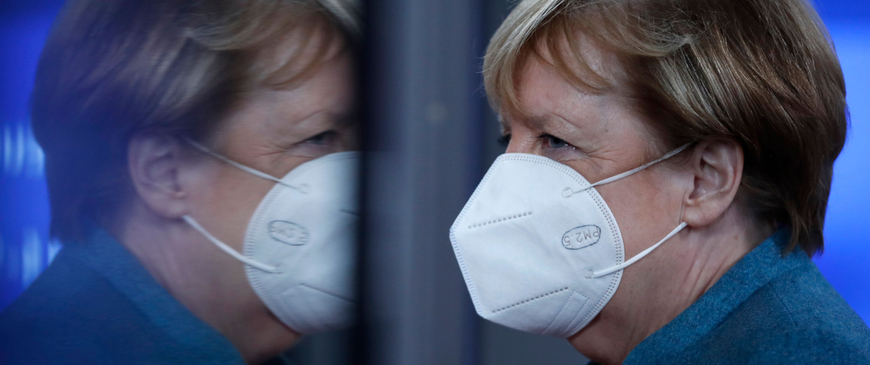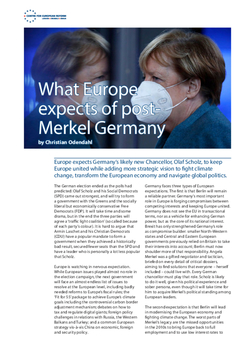
What Europe expects of post-Merkel Germany
Europe expects Germany’s likely new Chancellor, Olaf Scholz, to keep Europe united while adding more strategic vision to fight climate change, transform the European economy and navigate global politics.
The German election ended as the polls had predicted: Olaf Scholz and his Social Democrats (SPD) came out strongest, and will try to form a government with the Greens and the socially liberal but economically conservative Free Democrats (FDP). It will take time and some drama, but in the end the three parties will agree a ‘traffic light coalition’ (so called because of each party’s colour). It is hard to argue that Armin Laschet and his Christian Democrats (CDU) have a popular mandate to form a government when they achieved a historically bad result, secured fewer seats than the SPD and have a leader who is personally a lot less popular that Scholz.
Europe is watching in nervous expectation. While European issues played almost no role in the election campaign, the next government will face an almost endless list of issues to resolve at the European level, including badly needed reforms to Europe’s fiscal rules; the ‘Fit for 55’ package to achieve Europe’s climate goals including the controversial carbon border adjustment mechanism; debates on how to tax and regulate digital giants; foreign policy challenges in relations with Russia, the Western Balkans and Turkey; and a common European strategy vis-à-vis China on economic, foreign and security policy.
Germany faces three types of European expectations. The first is that Berlin will remain a reliable partner. Germany’s most important role in Europe is forging compromises between competing interests and keeping Europe united. Germany does not see the EU in transactional terms, nor as a vehicle for enhancing German power, but as the core of its national interest. Brexit has only strengthened Germany’s role as compromise builder: smaller North-Western states and Central and Eastern European governments previously relied on Britain to take their interests into account; Berlin must now shoulder more of that responsibility. Angela Merkel was a gifted negotiator and tactician, briefed on every detail of critical dossiers, aiming to find solutions that everyone – herself included – could live with. Every German chancellor must play that role. Scholz is likely to do it well, given his political experience and sober persona, even though it will take time for him to acquire Merkel’s political standing among European leaders.
The most important expectation after the German elections is that Berlin remains a reliable partner to help keep Europe united.
The second expectation is that Berlin will lead in modernising the European economy and fighting climate change. The worst parts of Merkel’s legacy are the missed opportunities in the 2010s to bring Europe back to full employment and to use low interest rates to invest in Europe’s future and the fight against climate change. In Europe, Merkel backed austerity and reforms aimed at reducing deficits. These reforms did not generate the economic growth that their proponents thought they would. In Germany, she led governments that spent most of their fiscal surpluses on increasing pensions instead of pushing with urgency for investment in digital infrastructure, innovation or preparations for the country’s fight against climate change. As a result, it took the eurozone until 2016 to return to the economic output level of 2008, and it will take Germany a decade to make up for the low levels of public investment of the Merkel years. Germany abandoned nuclear energy during her time in office, while remaining one of the worst polluters per capita in the world.
Towards the end of the Merkel years, political realities changed and balanced budgets became a lower priority. Brexit and Donald Trump’s presidency showed that in times of economic and social dislocation, even mature democracies were vulnerable to populism. The growing influence of authoritarian states (including China) in Europe led many German politicians to conclude that investment in the continent’s economic strength and political unity was vital if it was to remain resilient. Meanwhile, Germany’s debate on public spending and debt had become less dogmatic, as a new generation of German economists emerged and the previous decade’s economic policies were re-assessed. With negative interest rates and rapidly declining public debt, the German public no longer felt threatened by public debt. Finally, climate change had become the single biggest concern of German voters, convincing many policy-makers that all tools should be available to fight it, even if that meant crossing German red lines.
Merkel herself crossed one such red line, in response to the pandemic, and was backed by a surprisingly large segment of Germany’s economic policy community. Working with Scholz, her finance minister, she put together a recovery fund for the EU that not only involved up to €750 billion of common EU debt but also sizeable transfers to economically weaker countries in the South and East of Europe. The fund focuses on reforms and investments to make the European economy fit for the 21st century, including the digital and the green transitions.
Many European countries now expect German policy to favour more public spending and investment, though not necessarily in the form of transfers like the current recovery fund. High on the agenda is a green re-think of Europe’s fiscal rules, to allow for public investment (and support for private investment) not just in strong states like Germany, but all across Europe in order to reach net zero. Germany’s coalition agreement will set the tone for that debate, and Europeans are rightly expecting the SPD and the Greens to put a strong emphasis on greening Germany’s fiscal rules first. That is doable. The traffic light coalition may agree to a €500 billion climate transition fund, mostly outside the fiscal rules, to support both public and private investment, including encouraging Germany’s Mittelstand companies to make the transition to net zero and become innovators on climate. That in turn could become a model for a green investment clause in the European fiscal rulebook.
Europe expects Berlin to lead on making sure that the European economy makes a full recovery and manages the transit to net zero.
The third expectation is that the next German government should be more willing to incur an economic cost in order to make Europe a robust actor in foreign policy. That is arguably the trickiest area for Scholz. Both the FDP and the Greens have signalled that they back a tougher European approach towards autocratic regimes, including China. Scholz has voiced his support for a better-equipped Bundeswehr to underline Europe’s military strength, contrary to the views of others in his party. But talk is cheap. The gas crisis unfolding in Europe provides a first challenge, especially for the SPD. After backing the Nord Stream 2 gas pipeline from Russia to Germany, much to the horror of European partners, it is up to Berlin to show that Germany is willing to stand up to Russia in a geo-economic conflict. But Europe should not expect too much: the new government will only deviate cautiously from Merkel’s course – whether in relation to the yet-to-be-ratified EU investment agreement with China, Nord Stream 2 or relations with Turkey – and will focus first on strengthening alliances and building a common strategic outlook in Europe and with the US.
Scholz and his traffic light government will need a more strategic vision for Germany and Europe than the Merkel governments, but the same ability to find compromises and common European positions on thorny political issues. Merkel had a challenging decade full of crises to manage. Scholz will not have it any easier.
Christian Odendahl is chief economist at the Centre for European Reform
An earlier version was published as an editorial in Intereconomics Volume 56, Number 5, 2021.

